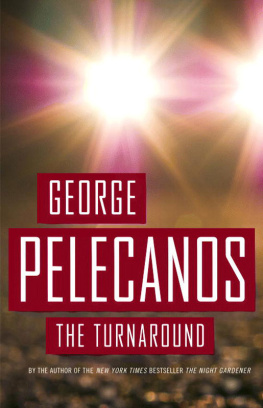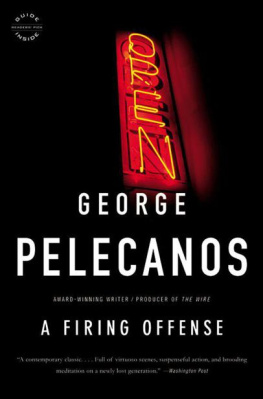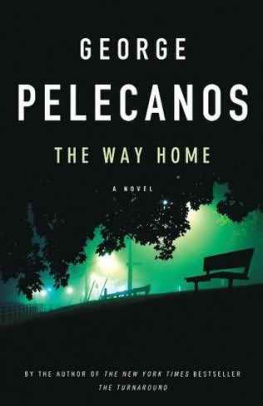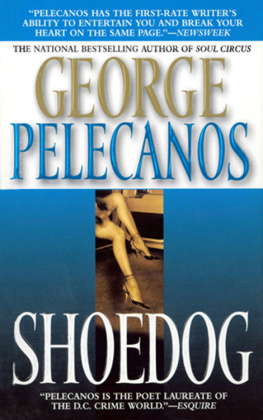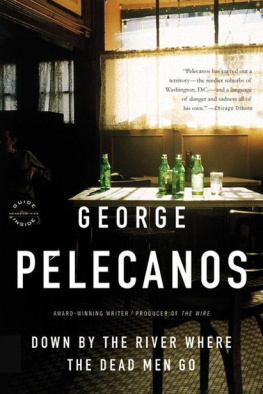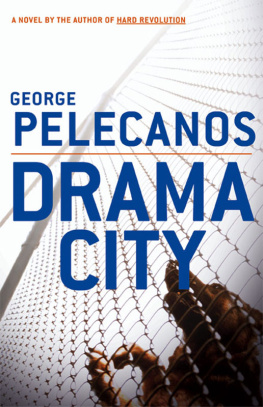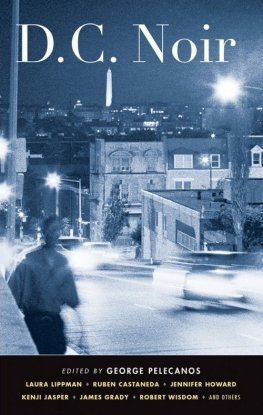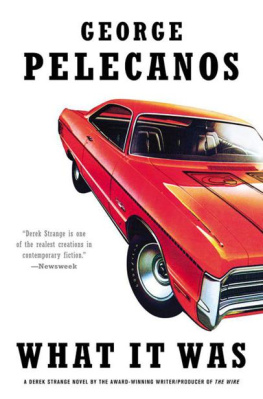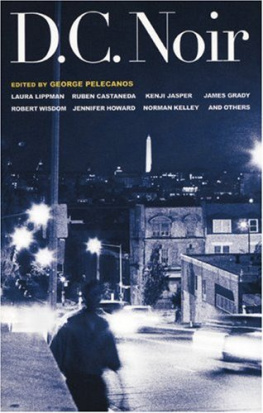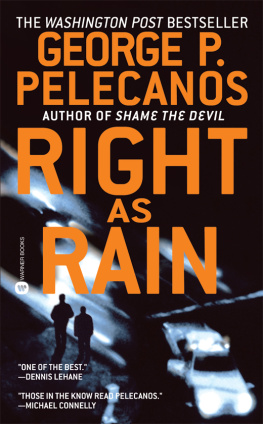George Pelecanos - The Turnaround
Here you can read online George Pelecanos - The Turnaround full text of the book (entire story) in english for free. Download pdf and epub, get meaning, cover and reviews about this ebook. genre: Detective and thriller. Description of the work, (preface) as well as reviews are available. Best literature library LitArk.com created for fans of good reading and offers a wide selection of genres:
Romance novel
Science fiction
Adventure
Detective
Science
History
Home and family
Prose
Art
Politics
Computer
Non-fiction
Religion
Business
Children
Humor
Choose a favorite category and find really read worthwhile books. Enjoy immersion in the world of imagination, feel the emotions of the characters or learn something new for yourself, make an fascinating discovery.
- Book:The Turnaround
- Author:
- Genre:
- Rating:4 / 5
- Favourites:Add to favourites
- Your mark:
- 80
- 1
- 2
- 3
- 4
- 5
The Turnaround: summary, description and annotation
We offer to read an annotation, description, summary or preface (depends on what the author of the book "The Turnaround" wrote himself). If you haven't found the necessary information about the book — write in the comments, we will try to find it.
The Turnaround — read online for free the complete book (whole text) full work
Below is the text of the book, divided by pages. System saving the place of the last page read, allows you to conveniently read the book "The Turnaround" online for free, without having to search again every time where you left off. Put a bookmark, and you can go to the page where you finished reading at any time.
Font size:
Interval:
Bookmark:
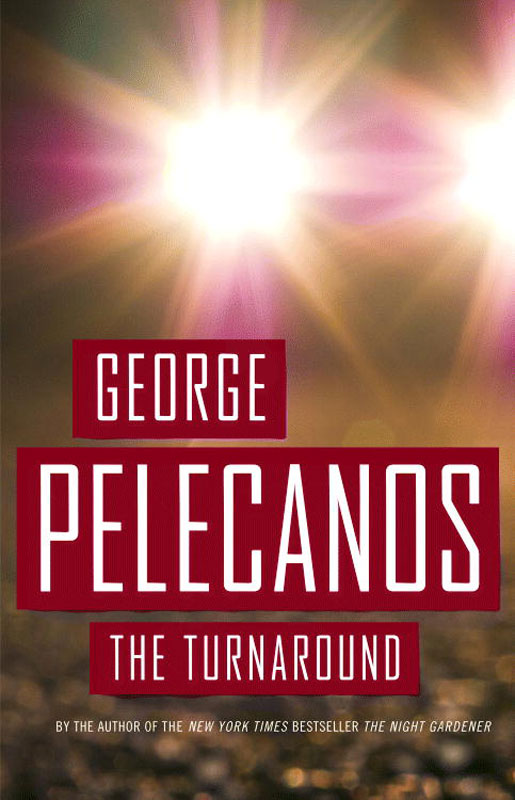
Copyright 2008 by George P. Pelecanos
All rights reserved. Except as permitted under the U.S. Copyright Act of 1976, no part of this publication may be reproduced, distributed, or transmitted in any form or by any means, or stored in a database or retrieval system, without the prior written permission of the publisher.
Little, Brown and Company
Hachette Book Group USA
237 Park Avenue, New York, NY 10017
Visit our Web site at www.HachetteBookGroupUSA.com
First eBook Edition: August 2008
The characters and events in this book are fictitious. Any similarity to real persons, living or dead, is coincidental and not intended by the author.
ISBN: 978-0-316-03278-0
Also by George Pelecanos
The Night Gardener
Drama City
Hard Revolution
Soul Circus
Hell to Pay
Right As Rain
The Sweet Forever
Shame the Devil
King Suckerman
The Big Blowdown
Down By the River Where the Dead Men Go
Shoedog
Nicks Trip
A Firing Offense
In Memoriam
Lance Cpl. Philip A. Johnson
3rd Battalion, 2nd Marine Regiment
2nd Marine Division
2nd Marine Expeditionary Force
H E CALLED the place Pappas and Sons Coffee Shop. His boys were only eight and six when he opened in 1964, but he was thinking that one of them would take over when he got old. Like any father who wasnt a malaka, he wanted his sons to do better than he had done. He wanted them to go to college. But what the hell, you never knew how things would go. One of them might be cut out for college, the other one might not. Or maybe theyd both go to college and decide to take over the business together. Anyway, he hedged his bet and added them to the sign. It let the customers know what kind of man he was. It said, This is a guy who is devoted to his family. John Pappas is thinking about the future of his boys.
The sign was nice: black images against a pearly gray, with Pappas twice as big as and Sons, in big block letters, along with a drawing of a cup of coffee in a saucer, steam rising off its surface. The guy whod made the sign put a fancy P on the side of the cup, in script, and John liked it so much that he had the real coffee cups for the shop made the same way. Like snappy dressers got their initials sewn on the cuffs of a nice shirt.
John Pappas owned no such shirts. He had a couple of blue cotton oxfords for church, but most of his shirts were white button-downs. All were wash-and-wear, to avoid the dry-cleaning expense. Also, his wife, Calliope, didnt care to iron. Five short-sleeves for spring and summer and five long-sleeves for fall and winter, hanging in rows on the clothesline he had strung in the basement of their split-level. He didnt know why he bothered with the variety. It was always warm in the store, especially standing over the grill, and even in winter he wore his sleeves rolled up above the elbow. White shirt, khaki pants, black oilskin work shoes from Montgomery Ward. An apron over the pants, a pen holder in the breast pocket of the shirt. His uniform.
He was handsome in his way, with a prominent nose. He had turned forty-eight in the late spring of 1972. He wore his black hair high up top and swept back on the sides, a little bit over the ears, longish, like the kids. He had been going with the dry look the past few years. His temples had grayed. Like many men who had seen action in World War II, he had not done a sit-up or a push-up since his discharge, twenty-seven years ago. A marine who had come out of the Pacific campaign had nothing in the way of manhood to prove. He smoked, a habit he had picked up courtesy of the Corps, which had added cigarettes to his K rations, and his wind was not very good. But the physical nature of his work kept him in pretty fair shape. His stomach was almost flat. He was especially proud of his chest.
He arrived at the store at five a.m., two hours before opening time, which meant he rose each morning at four fifteen. He had to meet the iceman and the food brokers, and he had to make the coffee and do some prep. He could have asked for the deliveries to come later so that he could catch another hour of sleep, but he liked this time of his workday better than any other. Matter of fact, he always woke up wide-eyed and ready, without an alarm clock to prompt him. Stepping softly down the stairs so as not to wake his wife and sons, driving his Electra deuce-and-a-quarter down 16th Street, headlights on, one cigaretted hand dangling out the window, the road clear of traffic. And then the quiet time, just him and the Motorola radio in the store, listening to the smooth-voiced announcers on WWDC, men his age who had the same kind of life experience he had, not those fast-talkers on the rock-and-roll stations or the mavres on WOL or WOOK. Drinking the first of many coffees, always in a go-cup, making small talk with the delivery guys who dribbled in, a kinship there because all of them had grown fond of that time between night and dawn.
It was a diner, not a coffee shop, but coffee shop sounded better, more highclass, Calliope said. Around the family, John just called the store the magazi. It sat on N Street, below Dupont Circle, just in from Connecticut Avenue, at the entrance to an alley. Inside were a dozen stools spaced around a horseshoe-shaped Formica-topped counter, and a couple of four-top booths along the large plate glass window that gave onto a generous view of Connecticut and N. The dominant colors, as in many Greek-owned establishments, were blue and white. The maximum seating was for twenty. There was a short breakfast flurry and a two-hour lunch rush and plenty of dead space, when the four employees, all blacks, talked, horsed around, brooded, and smoked. And his older son, Alex, if he was working. The dreamer.
There was no kitchen in the back. The grill, the sandwich board, the refrigerated dessert case, the ice cream cooler, the soda bar, and the coffee urns, even the dishwasher, everything was behind the counter for the customers to see. Though the space was small and the seating limited, Pappas had cultivated a large carryout and delivery business that represented a significant portion of the daily take. He grossed about three, three hundred and twenty-five a day.
At three oclock, he stopped ringing the register and cut its tape. The grill was turned down and bricked at four. There was little walk-in traffic after two thirty, but he kept the place open until five, to allow for cleanup, ordering, and to serve anyone who happened to drop in for a cold sandwich. From the time he arrived to the time he closed, twelve hours, on his feet.
And yet, he didnt mind. Never really wished he could make a living doing anything else. The best part of it, he thought as he approached the store, the night sky beginning to lighten, is now: bending down to pick up the bread and buns left outside by the Ottenbergs man, then fitting the key to the lock of his front door.
I am my own man. This is mine.
Pappas and Sons.
ALEX PAPPAS had had his thumb out for only a few minutes, standing on the shoulder of University Boulevard in Wheaton, before a VW Squareback pulled over to pick him up. Alex jogged to the passenger door, scoping out the driver as he neared the car. He looked through the half-open window, saw a young dude, long hair, handlebar mustache. Probably a head, which was all right with Alex. He got in and dropped onto the seat.
Hey, said Alex. Thanks for stoppin, man.
Sure thing, said the dude, pulling off the shoulder, catching second gear, going up toward the business district of Wheaton. Where you headed?
Font size:
Interval:
Bookmark:
Similar books «The Turnaround»
Look at similar books to The Turnaround. We have selected literature similar in name and meaning in the hope of providing readers with more options to find new, interesting, not yet read works.
Discussion, reviews of the book The Turnaround and just readers' own opinions. Leave your comments, write what you think about the work, its meaning or the main characters. Specify what exactly you liked and what you didn't like, and why you think so.

